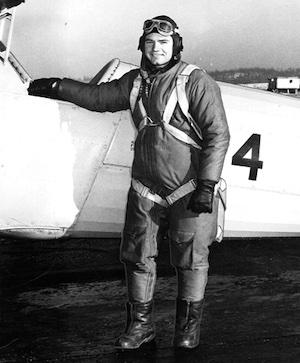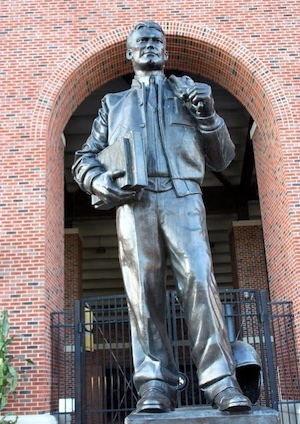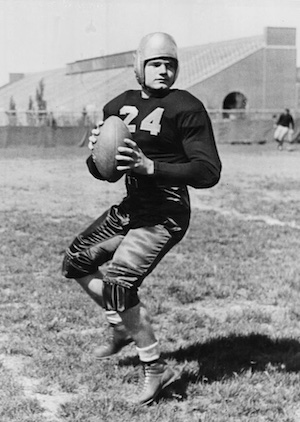By Cassidy Pekarek
Today, Nile Clarke Kinnick Jr. (1918-1943) is best known for his athletic legacy as the 1939 Heisman Trophy winner. Lesser known is Kinnick’s drive for excellence in academic pursuits that earned him Phi Beta Kappa status at the University Iowa.
“His dual identity as an athlete and scholar was manifested in the simple fact that he was a member of Phi Beta Kappa,” said Blaine Greteman (ΦΒΚ, Oklahoma State University), a professor of English at the University of Iowa and president of the Alpha of Iowa chapter.
Kinnick studied economics at the University of Iowa and joined the Hawkeye football team at a notable low point in their history. After scoring a record of 1-7 in 1937 and 1-6-1 in 1938, fans were shocked when the 1939 Hawkeyes finished the season with a 6-1-1 record. Kinnick led from the field, playing 402 of the 420 minutes possible and being involved in 107 of the 130 points Iowa scored. Within the season, Kinnick was named a consensus First-Team All-American and the Associate Press Male Athlete of the Year. He received the Maxwell Award, the Walter Camp Memorial Trophy, and the Big Ten MVP award.
When Kinnick received the Heisman Trophy, his acceptance speech captured national attention. The Heisman winner concluded, “I thank God I was warring on the gridirons of the Midwest and not on the battlefields of Europe. I can speak confidently and positively that the players of this country would much more, much rather struggle and fight to win a Heisman award than a Croix de Guerre.”
Graduating in 1940, Kinnick earned his bachelor’s degree from the UI College of Commerce with distinction. He was president of the senior class and one of thirty students inducted into the Alpha of Iowa chapter of Phi Beta Kappa. Despite the success he found on the field and the national interest he had captured, Kinnick enrolled in the UI College of Law. In his first year, Kinnick ranked third in his class of 106 students and worked as an assistant football coach to the Hawkeyes.
With a peacetime draft on the horizon and World War II creeping ever closer, Kinnick postponed his law degree to enlist in the Naval Reserve Air Corps. His service was cut tragically short after two years. During a routine training flight in 1943, Ensign Kinnick’s plane developed an oil leak that forced him to perform an emergency landing in the water. His body was never recovered.

“In such a fraught moment of [America’s] history, [Kinnick’s] combination of sportsmanship, athletic achievement, leadership, and intellectual endeavor. . . was a bright spot for the nation and a testament to the sort of young people that the nation was producing,” Greteman explained. “His early death was considered a tragedy.”
Kinnick’s legacy endures at the University of Iowa. In 1972, Iowa Stadium was renamed to Kinnick Stadium, where his Heisman acceptance speech plays before every Hawkeye football game. At the entrance stands the 2006 addition of Lawrence Nowlan’s monumental bronze statue of Nile Kinnick. He is depicted wearing his letterman jacket, textbooks in hand. His Phi Beta Kappa status is diligently recorded on the pedestal.

His academic legacy is also preserved on campus through the university’s commitment to uplifting students that exemplify Kinnick’s character. The Nile C. Kinnick Memorial Scholarship Fund awards incoming students that demonstrate Kinnick’s academic interest, athletic proficiency, and leadership abilities. The UI College of Law similarly honors Kinnick’s academic ambitions through their Kinnick Law Program, which serves as a pathway to the Juris Doctor Program for selected students.
Since his induction in 1940, the Alpha of Iowa chapter has continued to uphold the standard of excellence that Kinnick endeavored to represent all of his pursuits. The chapter has found recent success hosting a series of events through Phi Beta Kappa’s Visiting Scholars Program. In addition to promoting the organization’s Key into Public Service scholarship, the chapter also awards their own Stevens Phi Beta Kappa Scholarship to a junior every year.
Today, the UI Special Collections Department’s assortment of photos, letters, and even poems paint a clear picture of Kinnick—one that Greteman describes as “an example of academic success in corners where it might be unexpected.”
“Kinnick was this remarkably well-rounded student, having ambitions toward public service, politics, athletics, and academics. He was someone who found success in all of these areas,” Greteman elaborated. “He is an example of why it’s important to disassociate from the idea that academic success looks one very particular way. Phi Beta Kappa recognizes that excellence flourishes all over campus in many forms. We want to acknowledge that, and encourage students to be a part of that broader academic community, in whatever way that looks like to them.”
Cassidy Pekarek is a recent graduate of the University of Iowa, where she received her Bachelor of Arts degree with university honors and highest distinction in English & creative writing and art history. She was inducted into Phi Beta Kappa there in April 2022. The University of Iowa is home to the Alpha of Iowa chapter of Phi Beta Kappa.




